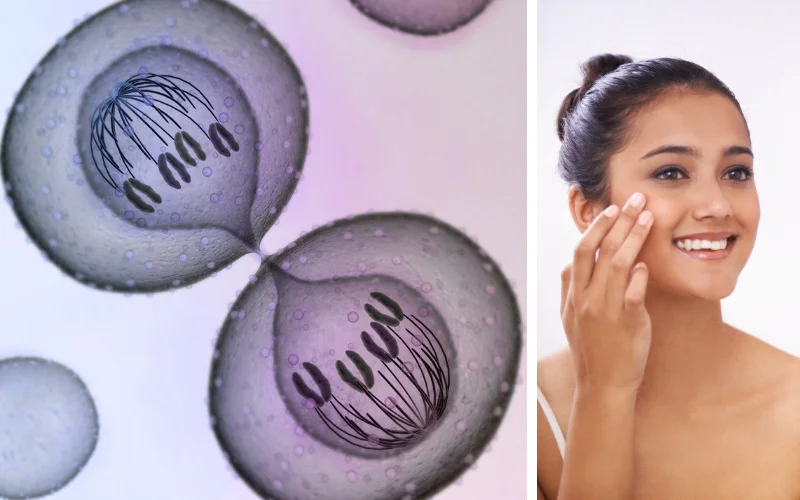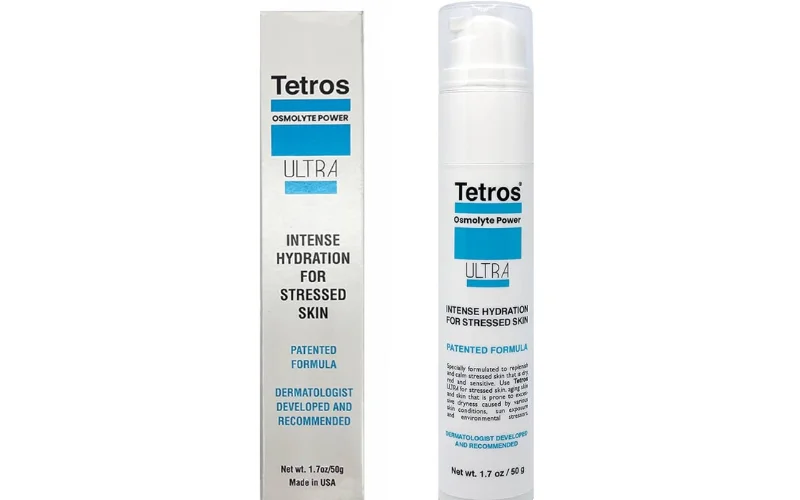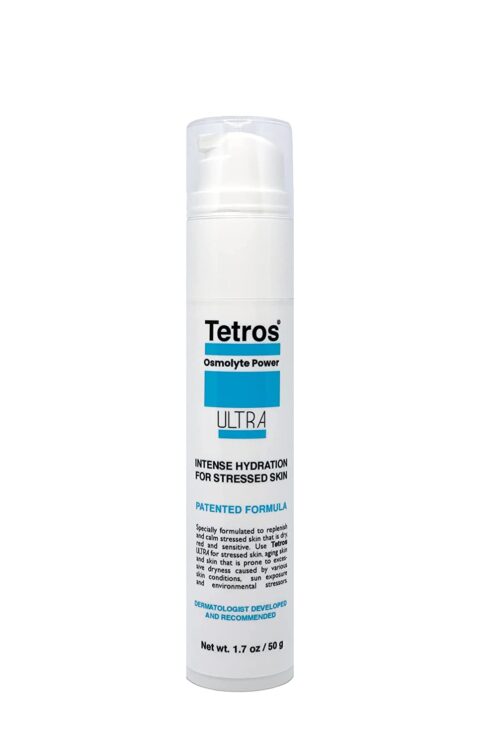Mitosis, the process of cell division that results in two genetically identical daughter cells, is essential to the growth, development, and maintenance of multicellular organisms. In the human body, this process is crucial for repairing injuries, replacing dead cells, and ensuring the proper functioning of various tissues, including the skin. The skin, our body’s largest organ, relies heavily on mitosis for its regeneration and repair. But what would happen if this pivotal process did not occur in skin cells? This blog delves into the hypothetical scenario of a world without mitosis in skin cells, exploring the consequences on individual health and the aging process.
Why Is Mitosis Important For Skin Health?
Mitosis is crucial for skin health as it allows for the constant renewal of skin cells. This process helps repair injuries, replace dead skin cells, and maintain the skin’s protective barrier against environmental damage.
Consequences Of Impaired Mitosis
The process of mitosis is crucial for the replenishment of skin cells. Without mitosis, skin cells would not be able to reproduce and eventually die out, causing various skin-related problems.: As we age, the rate of mitosis in our skin declines.
The Immediate Effects On Skin Health
Without mitosis, the skin’s ability to repair itself would be severely compromised. Cuts, scrapes, and other minor injuries would no longer heal properly, leading to increased risks of infection and prolonged recovery times. The absence of cell division would mean that once skin cells are damaged or die, they cannot be replaced. This would result in the accumulation of dead cells on the skin, causing severe dermatological conditions and potentially compromising the skin’s barrier function against pathogens.
Break The Cycle Of Stagnant Cell Repair With Tetros® ULTRA cream, and keep your skin’s Renewal Process In Full Swing.
Accelerate Aging Process
One of the most visible signs of aging is the condition of our skin. As we age, the number of skin cells decreases and becomes less efficient, which leads to thinner, less elastic skin. Without mitosis, this natural aging process would be drastically accelerated. Without the constant renewal of skin cells, forehead wrinkles, under eye wrinkles, fine lines, sagging, crepey skin, and other signs of aging would appear much earlier in life. The aging skin’s diminished ability to repair itself, retain moisture and its reduced elasticity would adversely affect appearance and increase the susceptibility to environmental stress and damage.
Long-Term Health Consequences
Beyond the immediate and visible effects on the skin, the absence of mitosis in skin cells would have profound long-term health consequences. The skin protects the body from UV radiation, harmful chemicals, and microorganisms. Without new cell generation, the skin’s effectiveness as a protective barrier would be severely weakened, leading to increased rates of skin cancer and other diseases.
Moreover, the skin is instrumental in regulating body temperature through sweating and the dilation or constriction of blood vessels. The inability to generate new skin cells would impair these thermoregulatory functions, leading to difficulties in maintaining body temperature. This could have serious implications for human survival in varying environmental conditions.
Psychological And Social Impact
The changes in appearance and increased health risks associated with the absence of mitosis in skin cells would also have significant psychological and social impacts. Skin conditions and visible signs of premature aging could lead to decreased self-esteem and increased social stigma, affecting mental health and social interactions. The collective increase in healthcare needs could strain medical systems and lead to broader societal and economic consequences.
Tips To Enhance Mitosis For Better Skin Health
Understanding how to support healthy mitosis in skin cells is essential for maintaining vibrant and resilient skin. Here’s a detailed look at the factors that can influence this process:
Nutrition
Proper nutrition plays a pivotal role in supporting cellular functions, including mitosis. Vitamins and minerals act as co-factors for DNA replication and cell division enzymes. For instance:
- Vitamin A is crucial for cell growth and differentiation. It helps repair skin tissues and maintain a healthy skin barrier.
- Vitamin C produces collagen, an essential protein for skin strength and elasticity. It also fights free radicals, protecting skin cells from damage.
- Vitamin E has antioxidant properties that protect skin cells from oxidative stress, thereby supporting healthy cell division.
- Zinc is involved in DNA synthesis and cell division. It’s vital for wound healing and immune function, which helps in managing conditions like acne and eczema.
Hydration
Hydration is key to maintaining cell function and elasticity. Water facilitates the transport of nutrients to cells and removes toxins, thereby supporting all cellular activities, including mitosis. Dehydrated skin can impair cell function, making it more susceptible to aging and damage. Drinking adequate water and applying hydration skincare products can help maintain optimal skin cell turnover and skin resilience.
Skin Care Practices
Regular and appropriate skin care routine is essential for removing dead skin cells and supporting the process of cell renewal:
- Gentle Cleansing: Helps in removing dirt, oil, and dead cells without stripping the skin of its natural oils, which helps protect and support cell turnover.
- Moisturizing: This maintains skin moisture and supports skin barrier function, which is essential for healthy cell division and turnover.
- Gentle Exfoliation: Helping to emove the surface layer of dead skin cells can promote healthier skin by encouraging the production of new cells. However, it’s important to exfoliate appropriately to avoid damaging the skin and impairing cell division.
Sun Protection
Excessive sun exposure can cause DNA damage in skin cells, leading to premature skin aging, visible signs of skin damage, and an increased risk of skin cancer. This damage can interfere with the normal process of mitosis, may cause mutations in DNA, and lead to abnormal cell growth. Using sun protection, including broad-spectrum sunscreen, wearing protective clothing, and seeking shade, can minimize UV radiation exposure, thereby supporting healthy cell division and turnover.
Protective Products
Tetros® ULTRA cream helps to protect and nourish the skin and support healthy mitosis. Products containing antioxidants (like vitamins C and E), retinoids (derivatives of vitamin A), peptides, and growth factors can stimulate cell growth and repair, contributing to healthier skin. These ingredients can help neutralize harmful free radicals, encourage collagen production, and support the skin’s natural repair processes.
Conclusion
Mitosis is a fundamental process that underpins the health and functionality of the skin, along with many other tissues in the human body. The hypothetical absence of this process in skin cells offers a stark reminder of the complex interplay between cellular mechanisms and our health. While such a scenario is purely speculative, it serves to appreciate our skin’s incredible resilience and regenerative capacity, driven by the ceaseless process of tissue regeneration through mitosis.
Frequently Asked Questions
How Does Mitosis Occur In Skin Cells?
Mitosis occurs in the deeper basal layer of the epidermis of the skin. As new cells are generated they gradually move towards the skin’s surface where they replace skin cells that shed naturally and those that are lost due to injury.
Can Mitosis Play A Role In Skin Conditions Or Diseases?
Abnormalities in mitosis can lead to skin conditions and diseases. Uncontrolled mitosis can result in skin cancer, while insufficient mitosis can contribute to chronic wounds and other dermatological conditions.












Leave A Comment